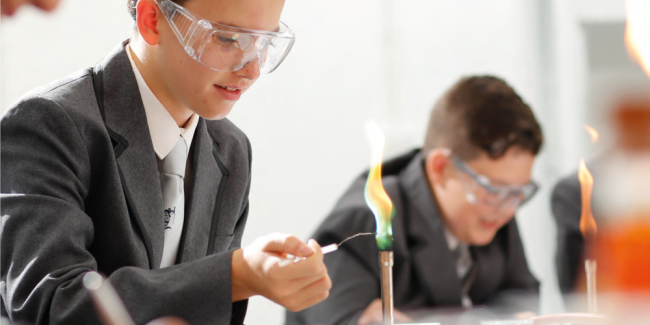
Interested in applying for Sixth Form at Holcombe Grammar School in September 2025?
To apply for a place at our Sixth Form for September 2025, please click here.

To apply for a place at our Sixth Form for September 2025, please click here.
At Holcombe Grammar School, our commitment to academic excellence is evident in our comprehensive approach to teaching Chemistry across all three Key Stages. In the foundational years of KS3, Chemistry is seamlessly integrated into our science curriculum, laying the groundwork for a deep understanding of the subject. As students progress to KS4, they are empowered with the choice to delve deeper into Chemistry through a dedicated standalone GCSE or as part of the Combined Science course, ensuring a tailored educational experience.
At the advanced level of KS5, we extend the opportunity for in-depth exploration by offering Chemistry as an A-Level option. Our overarching philosophy is centred on delivering a robust, knowledge-rich curriculum that equips students with the tools to excel academically. Throughout all three key stages, our approach emphasizes not only the acquisition of knowledge but also the application and evaluation of that knowledge.
A distinctive feature of our pedagogical approach is the active involvement of students in their own learning journey. We cultivate a sense of ownership by encouraging and supporting students to take a central role in their educational experience. The incorporation of a comprehensive thinking toolkit, with a particular emphasis on Reflection, Retrieval, and Interleaving of Knowledge, fosters critical thinking skills and ensures a holistic understanding of Chemistry.

Science is taught with a hands-on approach here at Holcombe Grammar School. The Science curriculum is made up of topics in Biology, Physics and Chemistry. We build upon the students’ experience of Science in primary school and provide fantastic foundations for further learning at GCSE. We strive to spark our students’ curiosity in the world around them so that they can understand the scientific implications that impact on their own lives. We aim to build knowledge, understanding and investigative skills. Students have six lessons of Science per fortnight. Students are assessed on their knowledge during each topic, as well as undergoing constant assessment on how well they apply their scientific knowledge and practical skills.
| Term 1 | Term 2 | Term 3 | Term 4 | Term 5 | Term 6 | |
|---|---|---|---|---|---|---|
| Matter - Particle Model and separating mixtures | Reactions - Acids and Alkalis | |||||
| Term 1 | Term 2 | Term 3 | Term 4 | Term 5 | Term 6 | |
|---|---|---|---|---|---|---|
| Earth - Structure, Climate and Resources | Matter - Periodic Table and elements | Reactions - Chemical energy and types of reaction | ||||
| Term 1 | Term 2 | Term 3 | Term 4 | Term 5 | Term 6 |
|---|---|---|---|---|---|
| Earth - Climate and Earth Resources | Matter - Atomic Structure and the Periodic Table | Matter - Separating Techniques and Chemical Analysis |
Please see attached Key Stage 3 Learning Journey for Chemistry.
Each GCSE will have a terminal examination worth 100% of the overall mark.
All students will study for a minimum of two Science GCSEs (Combined Science covers all three Science subjects -Biology, Chemistry and Physics and is worth two GCSEs). In all three subjects the specifications place an emphasis on ‘working scientifically’, teaching science through contemporary issues and communication of scientific ideas. ‘Working scientifically’ involves students looking at how scientific developments progress, the need to use data to support or disprove ideas and why data may not be reliable. The aim is to give the students the ability to analyse complex problems and to decide for themselves what solutions are appropriate using the available data.
The Biology course offers pupils the opportunity to examine how the body responds to the environment, keeping healthy, drugs and their implications, the body’s responses to infectious disease, factors affecting a species distribution and genetic inheritance, endangered species and how humans affect the environment, the effect of enzymes, micro-organisms and internal body systems and control.
The Chemistry course allows pupils to understand atomic structure, structure and bonding, calculations, chemical reactions, electrolysis, energy in reactions, rates of reaction, carbon compounds, the atmosphere and the use of resources.
The Physics course allows pupils to investigate thermal changes, efficiency of energy transfer and loss, electrical devices and circuits, generation of electricity using alternative sources, radiation and its uses and dangers, origins of the universe, how objects speed up or slow down, static electricity, current electricity, turning effects, mirrors and lenses as well as transformers.
Students will develop their mathematical skills in practical situations. They will have the opportunity to discuss scientific ideas and controversies and present information using a range of technologies.
The course provides a firm foundation for students who intend to study an A Level science. It develops critical thinking as well as problem solving skills allowing pupils to make informed evaluations of current scientific developments. Providing for jobs in health care, pharmaceuticals and bio-chemistry sectors as well as bio-medical research, engineering and construction.
| Term 1 | Term 2 | Term 3 | Term 4 | Term 5 | Term 6 |
|---|---|---|---|---|---|
Combined/Triple: Topic 2 Structure, Bonding and the Properties of Matter | Combined: Topic 7 Organic Chemistry
| Combined: Topic 4
| Combined/Triple: Topic 4 Chemical Changes | Combined/Triple: Topic 5 Energy Changes | Combined/Triple: Topic 3 Quantitative Chemistry |
Year 10 and 11 students who study triple science also cover the combined science topics as stated on the table.
| Term 1 | Term 2 | Term 3 | Term 4 | Term 5 | Term 6 |
|---|---|---|---|---|---|
| Combined/Triple: Topic 6 Rate and Extent of Chemical Change | Combined/Triple: Topic 6 Rate and Extent of Chemical Change | Combined/Triple: Topic 9 Chemistry of the Atmosphere | Combined/Triple: Topic 10 Using Resources | GCSE Exams | GCSE Exams |
Year 10 and 11 students who study triple science also cover the combined science topics as stated on the table.
Please see attached Key Stage 4 Learning Journeys for Chemistry.
Chemistry provides the opportunity to develop the manipulative, practical, analytical skills needed to interpret experimental data. It emphasises ability to apply knowledge and make predictions about unknown/new situations and in addition it enables you to understand the world around you, including some of the very processes of life itself.
| Term 1 | Term 2 | Term 3 | Term 4 | Term 5 | Term 6 |
|---|---|---|---|---|---|
| Atomic Structure and ToF Mass Spectrometry | Bonding | Redox and Amount of Substance | Energetics | Equilibria and Kc | Kinetics |
| Introduction and Alkanes | Haloalkanes and Alkenes | Alcohols and Organic Analysis | 3.2.1 Periodicity 3.2.2 Group 2, the alkaline earth metals 3.2.3 Group 7(17), the halogens | Isomerism and Carbonyls | Benzene |
| Term 1 | Term 2 | Term 3 | Term 4 | Term 5 | Term 6 |
|---|---|---|---|---|---|
Rate Equations Equilibrium constant Kp | Thermodynamics | 3.2.4 Properties of Period 3 elements and their oxides 3.1.11 Electrode potentials and electrochemical cells | Acids and Bases | Revision | Exams |
Aldehydes, Ketones, Carboxylic Acids and derivatives Amines | Polymers, Amino Acids and DNA Organic Synthesis | NMR Transition Metals | Aqueous Ions |
Please see attached Key Stage 5 Learning Journey for Chemistry.
A Level Chemistry is an essential requirement for studying Medicine, Dentistry and Veterinary Medicine and can lead to a large variety of career options, such as Chemical Engineering, Pharmaceuticals, Forensics, Biochemistry, Accountancy/Finance, Journalism/Publishing and Education. Universities particularly value the logical discipline and transferable skills developed through studying Chemistry and regard it as a facilitating subject for a diverse variety of courses, providing you with the scope to pursue virtually any career path.
The Chemistry curriculum at Holcombe Grammar School provides students with the opportunities to explore and evaluate not only the physical effects of scientific processes but also the moral and ethical implications. For example, when students study Atmospheric Chemistry they will not only need to consider the underlying process’ that have caused our atmosphere to change, and continue to change, but to also consider the moral, ethical and even political implications of these changes.
Students will also have the opportunity to showcase their skills by competing in the Royal Society of Chemistry International Olympiad, with the possibility of representing United Kingdom on the international stage.